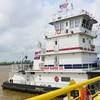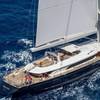World Shipping Accident 'Hotspots' Revealed
A report released by WWF points to ship accident-prone areas: the South China Sea & East Indies, east Mediterranean & Black Sea, and the busy shipping lanes around the British Isles, North Sea and Bay of Biscay.
The busy shipping lanes around the British Isles, North Sea and Bay of Biscay had the fourth largest number of shipping accidents in the world, with 135 reported incidents between 1999 and 2011 including fires, collisions and leakage of toxic waste. The North Sea is one of the most intensively sailed seas in the world with over 120,000 ship movements taking place there every year.
The WWF report also names the South China Sea and East Indies, east Mediterranean and Black Sea, as dangerous hotspots for accidents involving ships.
Dr Simon Walmsley, Marine Manger at WWF, said: “Shipping lanes around the UK are already some of the worlds’ busiest and will get busier as the global fleet expands. The risk of accidents and environmental disaster is only going to increase so efforts must be made to lower the risk.
“Unfortunately in the past we’ve seen that it is only after a major accident that safety and environment measures are reviewed. That needs to change if we want to maintain healthy seas.”
Since 1999 there have been 293 shipping accidents in the South China Sea and East Indies, home of the Coral Triangle and 76 per cent of the world’s coral species. As recently as April this year a Chinese fishing boat has run aground on a protected coral reef in the Philippines that had already been damaged by a US Navy ship in January.
Fishing vessels accounted for nearly a quarter of the vessels lost at sea but general cargo ships account for over 40 per cent. Cargo ships often operate short shipping routes, associated with the tramp trading where ships don’t have a set route and pick up opportunistic trade, particularly in Southeast Asia.
The risk to the environment is directly linked to the type and amount of hazardous substances, including oil, being transported and the sensitivity of the marine area where any accident could occur. In 2002, the Prestige oil tanker sunk resulting in over 70,000 tonnes of oil being released into the Atlantic Ocean off the Spanish coast.
“The Prestige oil spill caused not only environmental impacts but economic losses estimated at €8 billion. Even small scale accidents in very sensitive environments, like the Great Barrier Reef, can have profound environmental consequences.” added Dr Walmsley.
Climate change models show increased storm surges, changing wind and wave patterns and extreme weather events which are likely to exacerbate the risks of foundering leading to potential catastrophic environmental destruction. Fifty per cent of all accidents are caused by foundering, where a boat sinks due to rough weather, leaks or breaking in two.
As the global fleet continues to expand rapidly and begins to operate routinely in more risky areas the probability of accidents and likely severity of impacts will again increase unless precautionary measures are put in place to address identifiable risk factors.
“We really want to see the shipping industry promote greater owner and operator responsibility and encourage owners to register with better flag states, the country which a vessel is registered to.
“Additionally, irresponsible and badly performing owners and countries need to be exposed in order to motivate them to significantly increase their standards which will decrease the number of accidents we see still occurring today” said Dr Walmsley.
The report was undertaken by Southampton Solent University: Nickie Butt, Professor David Johnson, Dr.Kate Pike, Nicola Pryce-Roberts, Natalie Vigar.















